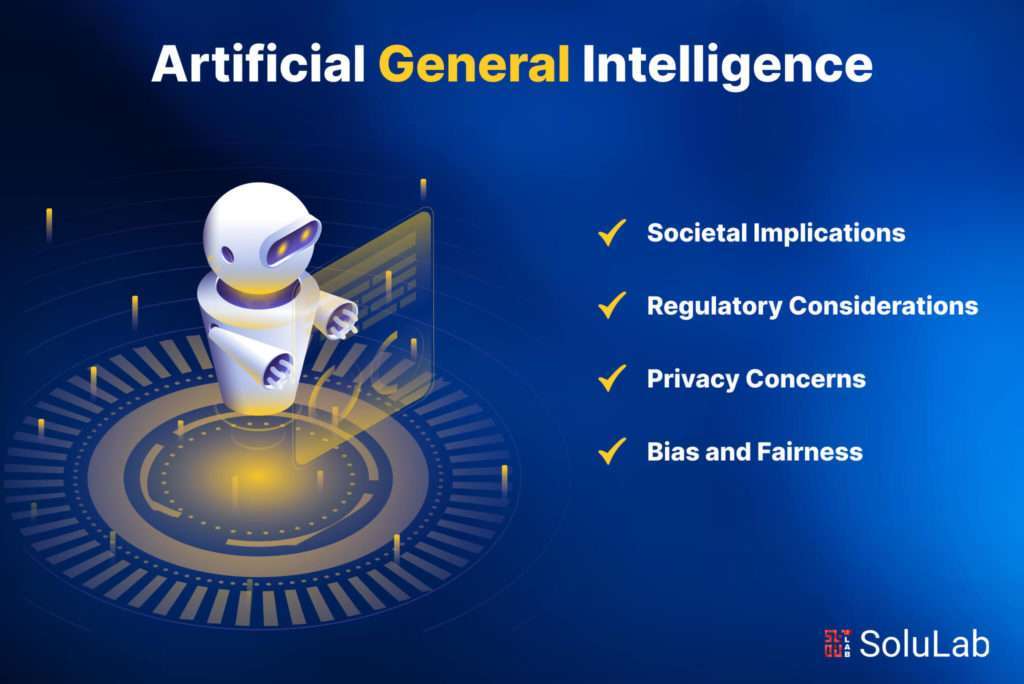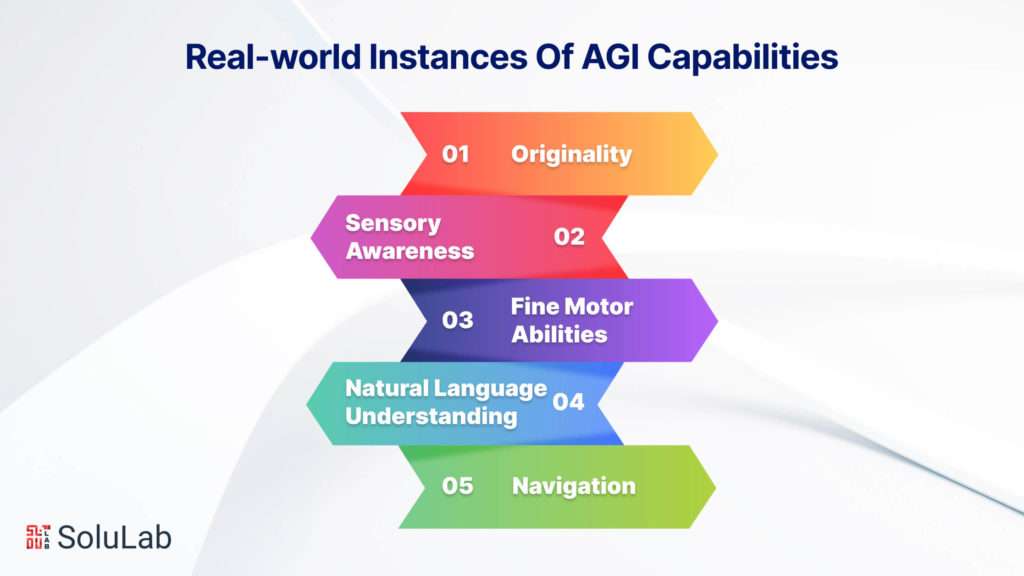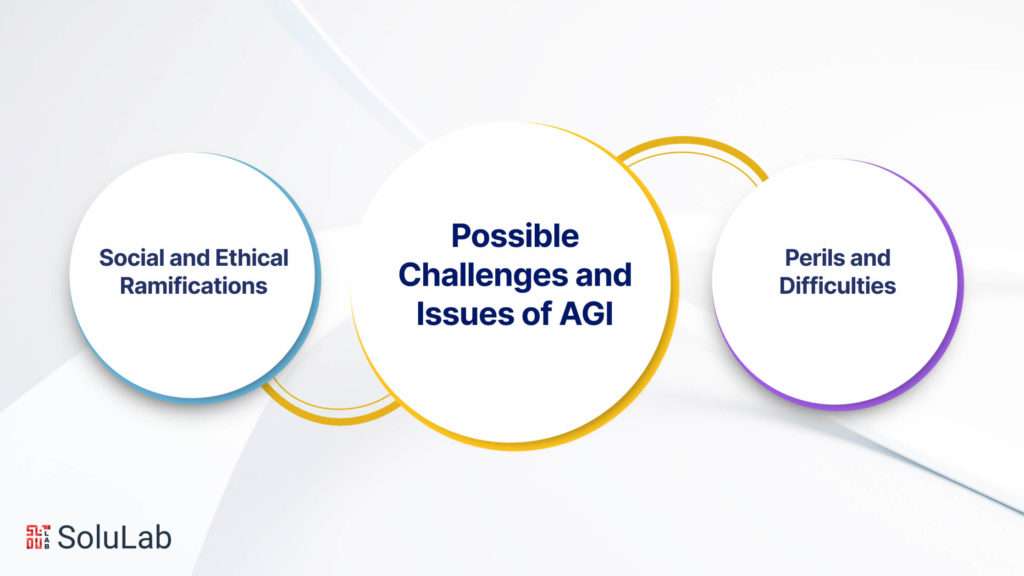
The ultimate stage of artificial intelligence research is Artificial General Intelligence (AGI). Simply said, artificial general intelligence (AGI) is a system that, like the human mind, processes, learns, adapts, and understands information. While AI is tailored to specific tasks, AGI seeks to achieve a more general and adaptable type of machine intelligence. Its objective is to provide machines the flexibility and capacity to solve problems needed to perform a variety of activities. In this blog post, we’ll examine the idea of artificial general intelligence (AGI), discussing its history, numerous applications, potentials, and hazards, as well as how this instrument may change artificial intelligence as we know it.
What Is Advanced General Intelligence (AGI)?
Beyond artificial intelligence lies Advanced General Intelligence, or AGI. AGI is flexible, understands context, and develops on its own, whereas AI is limited by predetermined guidelines. Also known as a subfield of theoretical artificial intelligence (AI) research called artificial general intelligence (AGI) aims to create AI that can think like a human and even teach itself. However, there is disagreement in the field on what really qualifies as “intelligence” and how to quantify it, and not all AI researchers think it is even feasible to create an AGI system.
AGI is sometimes referred to as universal AI or strong AI. These hypothetical types of AI are distinct from weak AI, often known as narrow AI, which can only carry out certain or specialized activities within predetermined bounds. AGI would be capable of independently resolving a wide range of challenging issues in several knowledge disciplines.
It resembles a system that obeys commands, gains knowledge from mistakes, deduces solutions from issues, and adjusts to novel situations.
The Operation of Artificial General Intelligence (AGI)
Opinions on how AGI may someday be implemented vary because it is still purely theoretical. Ben Goertzel and Cassio Pennachin, two AI researchers, state that “general intelligence” does not imply the same thing to all researchers. But in a “loose sense,” artificial intelligence (AGI) is defined as “AI systems that have a reasonable level of self-understanding and autonomous self-control and can solve a variety of complex problems in a variety of contexts, as well as learn to solve new problems that they weren’t aware of when they were created. There are several theoretical perspectives on how artificial general intelligence (AGI) may be developed due to the vague and dynamic character of both AI research and the idea itself. While some of these include approaches like deep learning and neural networks, others suggest employing computational neuroscience to build large-scale human brain models.
What Can Artificial General Intelligence Do?
Artificial General Intelligence (AGI) is a concept in computer science that describes intelligent systems capable of performing tasks at a level indistinguishable from human intelligence. Unlike narrow AI systems, which specialize in specific areas, AGI aims to achieve broad versatility and adaptability, enabling it to handle diverse tasks effectively. This would include reasoning, learning, problem-solving, and decision-making across multiple domains without requiring task-specific programming. The hallmark of AGI is its ability to process vast amounts of data at exceptional speeds, allowing it to not only match but potentially surpass human cognitive capabilities.
Currently, AGI remains a theoretical concept discussed primarily in research and science fiction, as no true AGI system exists. However, the successful development of AGI would mark a groundbreaking moment in technology, fundamentally changing industries, societies, and how we interact with machines. It could potentially automate complex human activities, enhance innovation, and unlock solutions to challenges that are currently beyond human capacity.
Fundamental Abilities of AGI
To be classified as truly general, AGI must exhibit a range of essential cognitive capabilities:
- Abstract Thinking: AGI should conceptualize ideas beyond immediate experiences, identifying patterns and relationships in complex scenarios.
- Background Knowledge: It should possess extensive foundational information across disciplines to support effective reasoning and problem-solving.
- Common Sense: AGI must demonstrate an intuitive understanding of practical, everyday situations, bridging gaps in incomplete information.
- Cause and Effect: Recognizing and analyzing how one action leads to specific outcomes is crucial for adaptive decision-making.
- Transfer Learning: AGI should apply knowledge gained in one context to solve entirely different problems, showcasing flexibility and adaptability.
These core abilities form the backbone of AGI, enabling it to operate seamlessly in dynamic and unpredictable environments.
Types of Artificial Intelligence
Artificial intelligence can be categorized into three primary types, one of which is artificial general intelligence (AGI).
-
Weak AI (Narrow AI)
Weak AI, also known as narrow AI, includes two subcategories: reactive machines and limited memory machines. Reactive machines can respond to immediate inputs or stimuli but lack the ability to retain or learn from past experiences. In contrast, limited memory machines can store historical data to enhance their performance over time. Despite these capabilities, weak AI is restricted to performing specific tasks within a narrow scope.
-
Strong AI (Artificial General Intelligence)
Strong AI, commonly referred to as AGI, replicates human-like intelligence. Unlike narrow AI, which is task-specific, strong AI can learn how to perform one task and transfer that knowledge to tackle entirely new challenges. This adaptability allows strong AI to solve complex problems and handle scenarios it hasn’t been explicitly trained for, demonstrating advanced reasoning and cognitive skills similar to humans.
-
Artificial Superintelligence (ASI)
Artificial superintelligence is a hypothetical form of AI that would surpass human intelligence by learning and evolving at an unprecedented pace. ASI is believed to be the key to creating self-aware AI systems. In this state, AI could operate independently, potentially disregarding human instructions or its originally intended objectives.
While most AI systems available today fall under the category of weak AI, many researchers believe we are gradually progressing toward the realization of artificial general intelligence.
Comparing Artificial Intelligence (AI) with Artificial General Intelligence (AGI)
Artificial general intelligence (AGI), or AI with a level of intelligence comparable to that of humans, is still a theoretical concept and research objective, even though artificial intelligence (AI) currently covers a wide range of technologies and research directions that deal with machine and computer cognition.
General intelligence is “the ability to learn anything (in principle),” according to AI researcher Peter Voss. His requirements said that AGI’s capacity for learning would have to be “autonomous, goal-directed, and highly adaptive.” Generally speaking, artificial general intelligence (AGI) is defined as AI that can equal human cognitive power and is classified as strong AI. (Artificial super intelligence [ASI] is another term for AI that falls within the strong AI category; it is AI that is superior to the capabilities of the human brain.)
Comparatively, as most AI now in use has been tailored to certain activities and purposes, it would be considered weak AI, or narrow AI. Though they still depend on some degree of human programming for accuracy and training, these AI systems may nonetheless be quite strong and sophisticated, with uses ranging from voice-activated virtual assistants to autonomous car systems.
These are a few instances of AI in use today:
- Customer service chatbots.
- voice assistants such as Alexa on Amazon and Siri on Apple.
- Users may discover and access material using recommendation algorithms like those used by Google, Netflix, and Spotify.
- Business intelligence (BI) and analytics solutions driven by artificial intelligence (AI) that analyze data, assess consumer sentiment and show data visualizations to end users.
- Applications for image and face identification and the deep learning algorithms they employ.
Can Artificial General Intelligence Perform Any Tasks?

In computer science, artificial general intelligence (AGI) refers to a system that possesses full or complete knowledge and cognitive computing skills. True artificial intelligence (AGI) systems do not yet exist; they are still the stuff of science fiction. In theory, these systems’ performance would be identical to that of a person. But because artificial intelligence (AGI) can access and analyze massive amounts of data at rates never seen before, its broad intellectual powers would surpass those of humans.
Real AGI ought to be able to do tasks and talents at the human level that no current machine is able to do. While AI is capable of many jobs today, it is not yet capable enough to be classified as human or general intelligence.
An AGI system ought to possess the following knowledge and skills:
- Abstract reasoning
- Prior information
- Common sense
- The relationship between cause and effect
- Transfer knowledge
Five real-world instances of AGI capabilities are as follows:
1. Originality. Theoretically, an AGI system might read, understand, and enhance human-generated code.
2. Sensory Awareness. Since color perception is a subjective sort of perception, AGI would be very good at it. In still photos, it would also be able to distinguish between three dimensions and depth.
3. Fine Motor Abilities. Taking a set of keys out of a pocket is one example of this, requiring a certain amount of creative vision.
4. Natural Language Understanding (NLU). Human language is very context-dependent in its meaning. NLU would be made possible by the amount of intuition possessed by AGI systems.
5. Navigation: A geographic position may be determined using the current Global Positioning System (GPS). When completely developed, AGI would surpass current technologies in its ability to project movement through physical surroundings.
Additionally, AGI systems are expected to have advanced capabilities, such as the following, according to AI researchers:
- Manage several kinds of algorithms for learning.
- Establish set structures for every task.
- Recognize symbol systems.
- Make use of a variety of knowledge sources.
- Recognize the various belief systems.
- Use your metacognitive knowledge and engage in metacognition.
Foundational Elements of Artificial Intelligence
Advanced machine learning methods, especially neural networks, and deep learning models provide the basis of AGI. Machines can now learn on their own, adapt to a variety of situations, and comprehend intricate patterns thanks to these advanced systems. Another important component of developing general intelligence is natural language processing, or NLP, which enables robots to understand and communicate with human language. Artificial General Intelligence (AGI) is facilitated by reinforcement learning, in which robots learn by making mistakes. AGI development may soon undergo a radical shift thanks to quantum computing, which has previously unheard-of processing capability. AGI development calls for a broad range of knowledge, bringing together experts in disciplines as disparate as computer science, neurology, psychology, and ethics.
The Advantages of AGI
AGI have the potential to have a positive influence on a variety of sectors and aspects of daily life.
- By processing and comprehending large medical datasets, artificial intelligence (AGI) has the potential to transform diagnosis and treatment planning in the healthcare industry. By using massive datasets to find patterns and create personalized medical approaches, AGI may quickly find new treatments and hasten the development of vaccines.
- By streamlining decision-making processes, artificial intelligence (AGI) helps the banking sector by analyzing complicated market patterns and risks.
- AGI-powered personalized learning may be able to adjust to the unique demands of each student, enhancing academic performance.
- The applications of AGI are not limited to supply chain management; they can also be applied to logistics to increase efficiency.
- Through smart homes, which provide user-friendly solutions for convenience and energy efficiency, artificial intelligence (AGI) might streamline daily operations.
- Large datasets related to environmental sustainability may be analyzed by AGI to forecast climatic patterns, maximize resource use, and support more successful conservation initiatives.
Furthermore, the ability of AGI to solve problems could be crucial in formulating plans for reducing poverty, promoting economic stability, and responding to natural disasters.
Consequently, AGI offers an alluring chance to tackle intricate worldwide problems, positioning it as a potent ally in addressing matters ranging from public health emergencies to climate change.
Artificial General Intelligence Examples
There aren’t any real AGI systems available currently. Nonetheless, there are instances of limited artificial intelligence systems that mimic or even surpass human capabilities in some domains. Research on artificial intelligence is concentrated on these systems and the potential applications of AI in the future.
Here are a few instances of such systems:
1. Watson from IBM. Supercomputers like Watson can do computations that regular computers are unable to. They use artificial intelligence (AI) in conjunction with their enormous processing capacity to do research and engineering jobs that were previously unattainable, including simulating the Big Bang hypothesis of the universe’s creation or the human brain.
2. Knowledgeable Systems. These AI-driven systems simulate human decision-making. They may, for instance, forecast molecular structure and provide medication recommendations based on patient data.
3. Autonomous Vehicles. These AI-driven cars follow traffic laws and regulations and can identify other cars, pedestrians, and objects on the road.
4. Intelligence Ross. Known alternatively as the AI attorney, ROSS is a legal expert system. In less than three seconds, it can extract information from around one billion text documents, evaluate the data, and give accurate answers to challenging queries.
5. AlphaGo. This is yet another instance of limited intelligence that is particularly good at tackling a certain kind of problem. A computer program called AlphaGo is capable of playing the board game Go. Go is an intricate game that is challenging for people to learn. In a five-game duel in 2016, AlphaGo defeated Lee Sedol, the world champion.
6. Model of Language Producing Transformer with Prior Training. OpenAI’s GPT-3 and GPT-4 are public releases of their software that can produce human language autonomously. Every time, the technology can simulate general human intellect. While the material can occasionally be mistaken for human-written content, AI output is frequently faulty.
7. AIs for Music. Dadabots is an artificial intelligence program that can produce a stream of its own rendition of music given a corpus of preexisting music.
The functionality of several of the previously mentioned examples may be enhanced if AGI were to be used. Self-driving automobiles, for instance, need a person there to manage decision-making in murky circumstances. The same holds true for linguistic models, legal systems, and algorithms that create music. These fields encompass both AI-automatable jobs and those that need a greater degree of abstraction and human intellect.
Possible Challenges and Issues

The world of artificial general intelligence (AGI) is complicated and full of obstacles to overcome. It is imperative that we address the possible challenges and concerns that may occur as we proceed with the development and deployment of AGI. This section examines the complex terrain of artificial general intelligence AI, illuminating the challenges that scientists, technologists, and society at large must overcome to achieve AGI. These challenges range from technological impediments to moral quandaries.
Social and Ethical Ramifications
The notion that computers may have cognitive capacities similar to those of humans raised a number of ethical and societal issues, including:
- Concerning the proper development, application, and governance of AGI, ethical conundrums occur.
- Data privacy, algorithmic bias, and transparency concerns must be addressed since AGI systems must be trusted to make decisions that have an influence on people and communities.
- Concerns about the future of job displacement due to the pace of automation also surface on the social front.
It is imperative to strike a balance between innovation and ethical responsibility, which calls for the development of rules and multidisciplinary cooperation.
Read Also: Use Cases Of AI Agents
Perils and Difficulties
Advanced General Intelligence (AGI) research and development has enormous potential, but there are also certain hazards and difficulties that should be carefully considered.
- The problem with control is that AGI systems that are capable of independent decision-making may behave erratically. Thus, it becomes crucial to make sure AGI is in line with human values in order to avoid unexpected outcomes.
- AGI algorithms have the potential to be biased and discriminatory, which both reflects and reinforces societal injustices.
- Job displacement due to automation advancements brought about by AGI may cause industries to change and maybe change the nature of work. This ultimate shift necessitates adaptation in order to maintain a balance between worker stability and technological advancement.
- Since AGI systems handle enormous volumes of personal data, privacy is a significant problem as well. Protecting personal information becomes essential to prevent misuse or illegal access. Another important factor to take into account is control, as it raises concerns about who is in charge of making decisions concerning AGI.
Getting Ready for the Future
Numerous resources offer valuable insights into the subtleties of this emerging discipline of Advanced General Intelligence AI (AGI) for those who are curious about learning more.
- Comprehensive courses in machine learning, artificial intelligence, and the fundamental ideas required to comprehend AGI are available on platforms such as Coursera and edX.
- Theoretical Foundations of AGI, Engineering General Intelligence AI, and AGI conference proceedings are all available from Springer.
- JAGI in the Sciendo JournalThe AGI journal is an academic publication with open access and peer review.
- A good place to start reading about the subject is this December 2014 survey by Ben Goertzel.
- Although Pei Wang’s soft introduction to AGI lacks precise, scientific data, it does provide a wealth of literature and resources.
- The AGI society provides online materials on the following page.
There is a lot of discussion on when, if at all, we will be able to build artificial general intelligence (AGI). Many prominent computer scientists and businesspeople predict that artificial general intelligence (AGI) will emerge in the next decades:
- In 2020, Unanimous AI’s principal scientist and CEO, Louis Rosenberg, made the prediction that AGI will be realized by 2030.
- According to Ray Kurzweil, the head of engineering at Google and a pioneer in the field of pattern recognition, artificial intelligence (AI) will approach “human levels of intelligence” in 2029 and eventually eclipse human intelligence by 2045.
- AGI is predicted to occur by 2050 by Jürgen Schmidhuber, the head of IDSIA, a Swiss AI institute, and co-founder and chief scientist of NNAISENSE.
AGI’s future, however, is still up for debate and the subject of continuous study; some academics even contend that it will never be possible to achieve AGI. According to AI researcher Goertzel, there is no “thorough and systematic theory of AGI” and “many different routes to AGI, involving the integration of different sorts of subsystems,” making it challenging to quantify the development of AGI objectively. Instead, it’s a “patchwork of overlapping concepts, frameworks, and hypotheses” that are “sometimes contradictory, but often synergistic.”
Sara Hooker of the research center Cohere for AI stated in an interview that the future of artificial intelligence (AGI) is essentially a philosophical concern. Because we work in a scientific subject, it might be challenging at times to be in this profession.
Conclusion
Finally, “A Guide to Artificial General Intelligence” summarizes the vast field of AGI, shedding light on its complexities, possibilities, and implications for both technology and humankind’s future. This guide gives readers a thorough knowledge of this constantly changing area by going beyond the basics of artificial intelligence to explore real-world applications. SoluLab is a top artificial intelligence development company that leads the way in AGI innovation by providing customized services and solutions that maximize AGI’s limitless potential. Businesses may set off on a voyage of exploration, innovation, and expansion with our team of skilled artificial general developers, use AGI to open up new avenues and promote long-term success. With SoluLab, implement the power of artificial intelligence and lead your company into a future of unimaginable possibilities and boundless potential. Contact us today!
FAQs
1. What is Artificial General Intelligence (AGI), and how does it differ from other forms of AI?
AGI refers to a form of artificial intelligence that possesses general cognitive abilities similar to humans, enabling it to understand, learn, and adapt to a wide range of tasks and contexts. Unlike narrow AI, which is designed for specific tasks, AGI aims to emulate human-like intelligence across various domains.
2. How close are we to achieving AGI, and what are the current challenges in its development?
Achieving AGI remains a significant challenge, and experts have varying opinions on the timeline for its realization. While rapid advancements in AI technologies have brought us closer to AGI, significant obstacles such as understanding human cognition, achieving robustness and reliability, and addressing ethical concerns still need to be overcome.
3. What are the potential applications of AGI in real-world scenarios?
AGI has the potential to revolutionize numerous industries and domains, including healthcare, finance, education, transportation, and more. Its ability to understand and learn from diverse data sources can lead to breakthroughs in personalized medicine, autonomous vehicles, intelligent tutoring systems, and beyond.
4. What ethical considerations and societal implications are associated with AGI?
AGI raises profound ethical questions regarding autonomy, privacy, bias, accountability, and the impact on the job market. Ensuring the responsible development and deployment of AGI requires careful consideration of these ethical implications and proactive measures to mitigate potential risks.
5. How can businesses leverage AGI to gain a competitive advantage?
Businesses can harness AGI to optimize processes, make data-driven decisions, enhance customer experiences, and drive innovation. By leveraging AGI-powered solutions, organizations can gain a competitive edge by unlocking new insights, improving efficiency, and staying ahead of AI trends.
6. Are there any AGI examples or use cases that demonstrate its capabilities?
While AGI remains a theoretical concept, there are examples of advanced AI systems that exhibit capabilities approaching AGI. These include language models like OpenAI’s GPT-3, which can generate human-like text, and reinforcement learning agents that demonstrate complex decision-making in simulated environments.
7. What role does SoluLab play in AGI development, and how can businesses benefit from its expertise?
SoluLab is at the forefront of AGI development, offering tailored AI development services and solutions to businesses seeking to leverage the power of AGI. With a team of expert AI developers and a focus on innovation, SoluLab empowers businesses to navigate the complexities of AGI and unlock new opportunities for growth and success.






